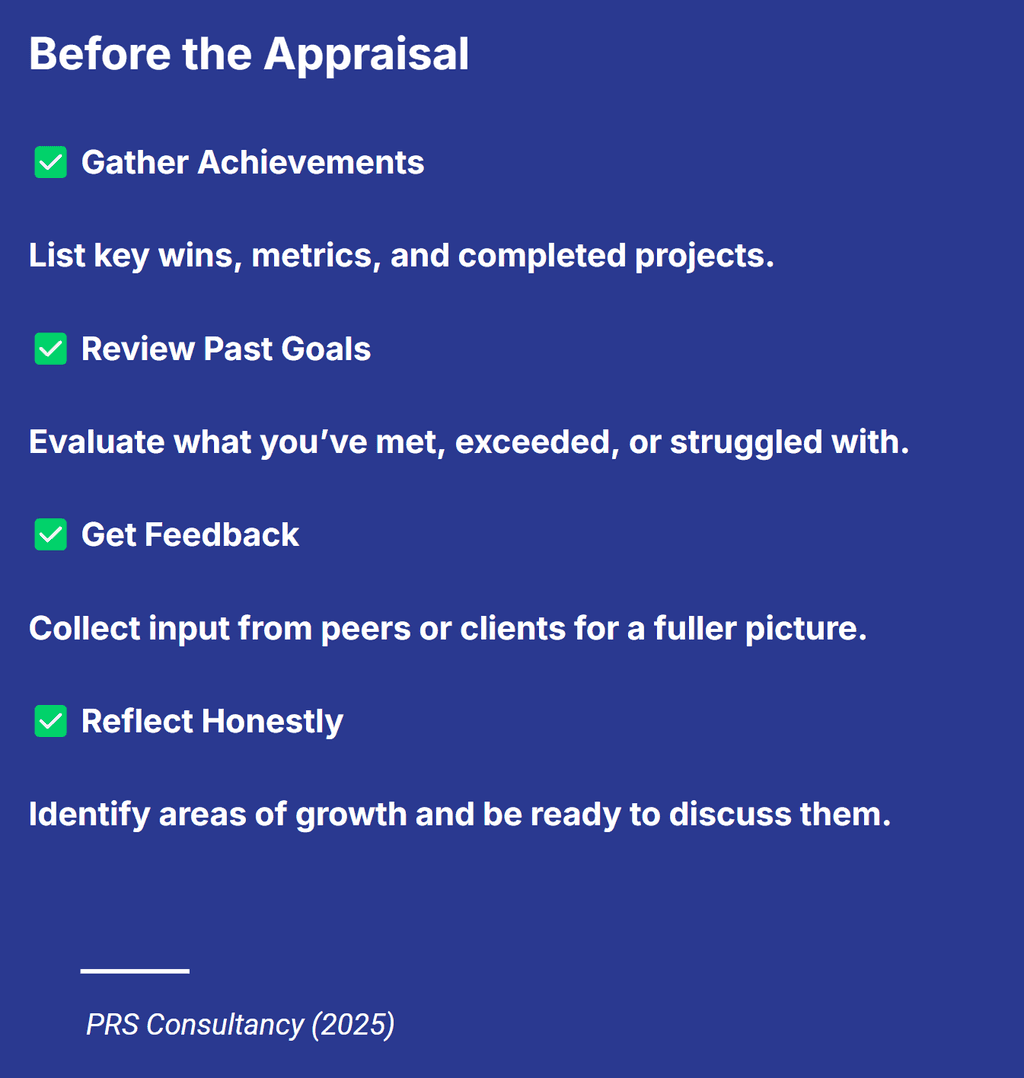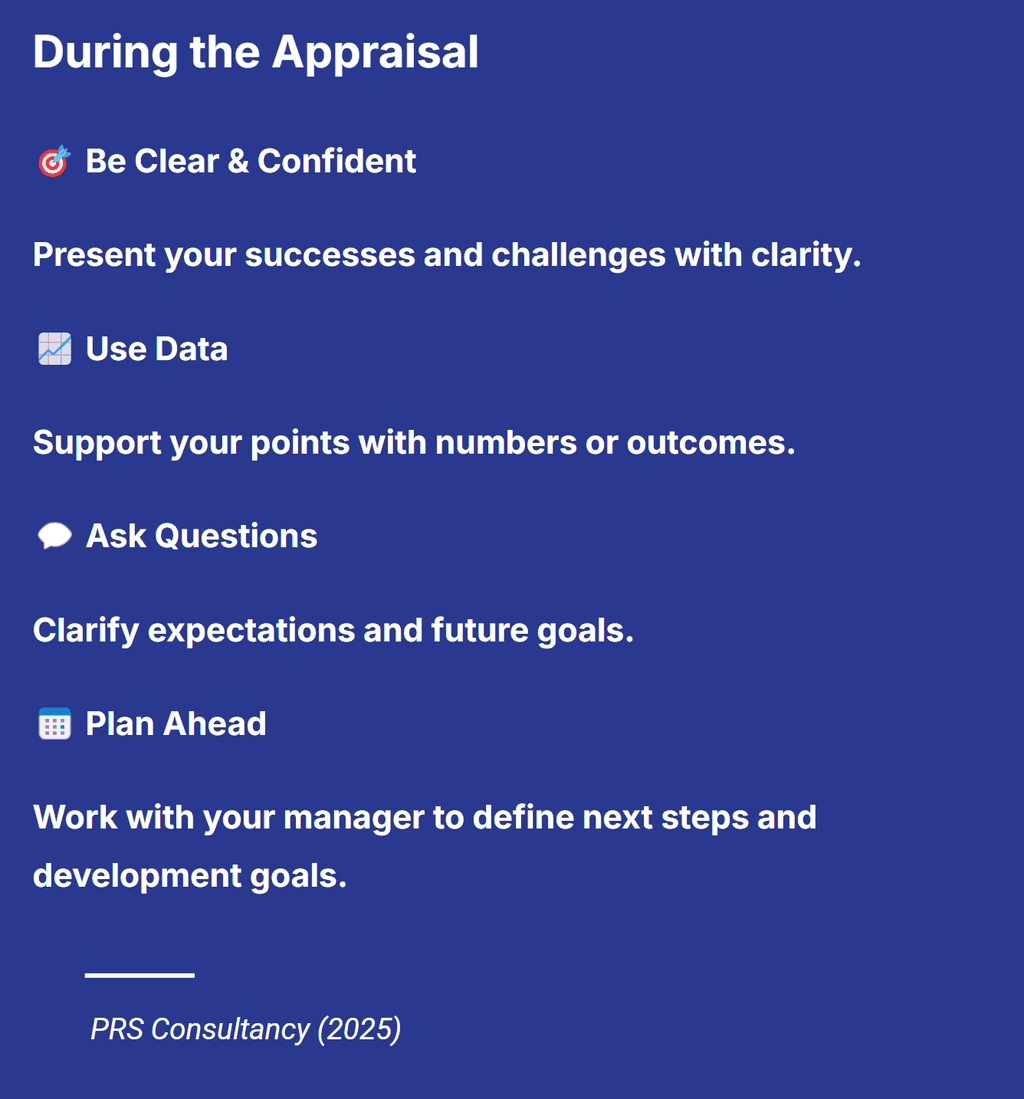Performance appraisals are essential milestones in an employee's professional journey, providing valuable opportunities for growth, recognition, and career advancement. According to Harvard Business Review, organizations are increasingly reconsidering traditional performance reviews to make them more effective and meaningful for both employees and managers. However, many employees approach these evaluations with anxiety or uncertainty about how to effectively prepare. In this blog post, we will outline practical strategies and actionable tips to help you confidently prepare for your upcoming performance appraisal, ensuring you can showcase your achievements and address areas for improvement constructively.
1. Documentation and Achievement Tracking:
Maintaining comprehensive records of your accomplishments is crucial for effective performance appraisal preparation. Consider these practical approaches to documentation:
- Create a dedicated "accomplishment journal" to record significant achievements, projects completed, and challenges overcome throughout the review period.
- Collect tangible evidence of your contributions, such as positive client feedback, successful project metrics, or productivity improvements.
- Quantify your achievements whenever possible with specific numbers, percentages, and measurable outcomes.
- Document instances where you've gone beyond your job description to add value to your team or organization.
- Keep track of any professional development activities, including training sessions, certifications, or skills acquired during the review period.
For software professionals specifically, documenting technical achievements and test results is particularly important. Our guide on performance review examples for software testers provides excellent industry-specific examples of accomplishments worth tracking.

2. Self-Assessment and Reflection:
A thorough self-evaluation before your performance appraisal enables you to gain valuable insights into your strengths and areas for improvement. Here's how to conduct an effective self-assessment:
- Review your job description and previous performance goals to evaluate your progress and accomplishments.
- Honestly assess your strengths and weaknesses related to your current role and responsibilities.
- Identify specific examples where you've excelled and areas where you recognize room for growth.
- Reflect on feedback received throughout the year from colleagues, supervisors, and clients.
- Consider how your work has aligned with and contributed to departmental and organizational objectives.
Research from MIT Sloan Management Review suggests that effective self-assessment includes connecting individual contributions to broader organizational goals, which significantly increases the perceived value of your work.
3. Goal Review and Future Planning:
Evaluating past goals and setting new objectives is a critical component of the performance appraisal process. Follow these steps for effective goal management:
- Assess the status of goals set during your previous review, noting those completed, in progress, or requiring adjustment.
- Prepare to discuss any obstacles that prevented goal completion and how you adapted to these challenges.
- Develop specific, measurable, achievable, relevant, and time-bound (SMART) goals for the upcoming review period.
- Align your proposed goals with your career aspirations and your organization's strategic objectives.
- Consider what resources, support, or training you might need to achieve these new goals successfully.
Modern organizations often use performance review software to track goals and progress throughout the year. Familiarizing yourself with your company's performance management tools can help you maintain better documentation and alignment with organizational objectives.

4. Communication and Presentation Skills:
How you communicate during your performance appraisal significantly impacts its effectiveness. Consider these communication strategies:
- Prepare concise talking points highlighting your key achievements, challenges, and growth areas.
- Practice articulating your contributions clearly and confidently, avoiding both underselling and overselling yourself.
- Develop specific examples that illustrate your skills, work ethic, and alignment with company values.
- Prepare thoughtful questions to ask your manager about expectations, growth opportunities, and feedback.
- Adopt a positive, solution-oriented approach when discussing challenges or areas for improvement.
5. Feedback and Improvement Planning:
Being receptive to feedback and prepared to discuss development opportunities demonstrates professionalism and growth mindset. Here's how to approach this aspect:
- Mentally prepare to receive constructive criticism with openness and without becoming defensive.
- Reflect on feedback trends you've received throughout the year and be ready to discuss your improvement efforts.
- Develop a preliminary professional development plan to address known growth areas.
- Research specific training opportunities, mentorship possibilities, or resources that could support your development.
- Consider how you can leverage your strengths to overcome challenges or compensate for areas needing improvement.
The Yale School of Management emphasizes that being receptive to feedback is one of the most important factors in career growth and progression. Developing this skill can significantly enhance your professional development trajectory.
Performance appraisals provide valuable opportunities for professional growth, recognition of achievements, and alignment with organizational goals. By thoroughly documenting your accomplishments, conducting honest self-assessment, reviewing and setting meaningful goals, preparing your communication approach, and embracing feedback constructively, you position yourself for a productive and beneficial review.
Many forward-thinking companies are now implementing employee evaluation software to streamline the appraisal process and provide more continuous feedback throughout the year. These platforms can offer valuable insights into your performance metrics and help you prepare more effectively.
Remember that preparation is key to transforming what might otherwise be a stressful experience into a positive catalyst for career development and advancement. As Cornell University's HR department notes, employees who actively participate in their performance discussions report higher job satisfaction and better long-term career outcomes.

Frequently Asked Questions
How far in advance should I begin preparing for my performance appraisal? Ideally, start preparing at least 2-3 weeks before your scheduled review. This gives you sufficient time to gather documentation, reflect on your performance, and prepare thoughtful responses without feeling rushed.
What should I do if I disagree with feedback during my performance appraisal? If you disagree with feedback, respond professionally by asking for specific examples and clarification. Take time to consider the perspective being shared before responding. If appropriate, provide context or additional information that might not be apparent to your manager.
Should I mention challenges or mistakes during my performance review? Yes, addressing challenges proactively demonstrates self-awareness and integrity. However, frame these discussions constructively by focusing on what you learned, how you've improved, and steps taken to prevent similar issues in the future.
How can I highlight achievements without sounding boastful? Focus on objective results and impact rather than subjective self-praise. Use quantifiable metrics and concrete examples, and acknowledge team contributions where appropriate. Let your accomplishments speak for themselves through specific outcomes and results.
Should I discuss salary or promotion during my performance appraisal? This depends on your organization's culture and processes. If performance reviews are explicitly tied to compensation decisions, it may be appropriate. Otherwise, you might request a separate meeting specifically focused on career advancement and compensation after receiving your performance feedback.
How should I approach discussing my career aspirations during the review? Frame your career aspirations in terms of how they align with organizational goals and how your growth benefits the company. Be specific about skills you want to develop and experiences you'd like to gain, while remaining flexible and realistic about timelines and opportunities.
What if my performance was impacted by factors outside my control? It's appropriate to acknowledge external factors that affected your performance, but focus primarily on how you adapted to these challenges and what you learned from them. Emphasize your resilience and problem-solving approach rather than dwelling on the obstacles themselves.
